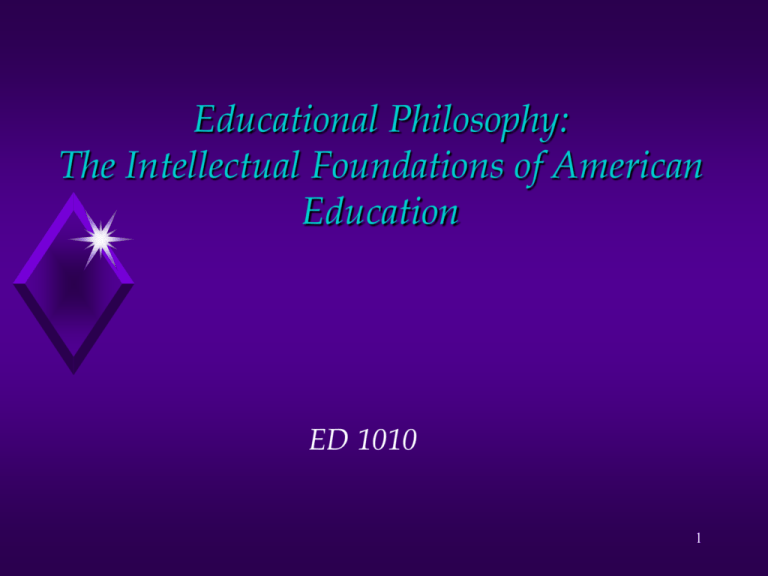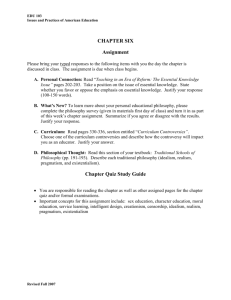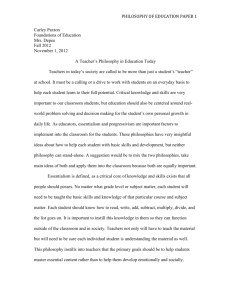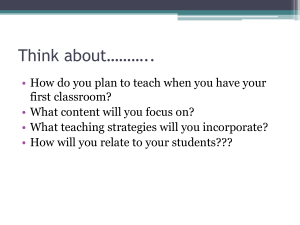Chapter 6 Educational Philosophy
advertisement

Educational Philosophy: The Intellectual Foundations of American Education ED 1010 1 What is Philosophy? • The investigation of causes and laws underlying reality • Inquiry into the nature of things based on logical reasoning rather than empirical methods • A system of values by which one lives 2 Educational Philosophy • A philosophy about education requires systematic, critical thinking about educational practice. • A teacher’s educational philosophy helps the educator interpret, find meaning, and direct the daily work of the classroom 3 Philosophy and Teacher Professionalism • All professions have philosophical underpinnings. • Educational philosophy is one important aspect of teacher’s professional knowledge. 4 Traditional Schools of Philosophy Educational Philosophies have roots in these schools •Idealism • Asserts that because the physical world is always changing, ideas are the only reliable form of reality •Realism • The features of the universe exist whether or not a human being is there to perceive them. •Pragmatism • Rejects the idea of absolute, unchanging truth, instead asserting that truth is “what works” •Existentialism • humanity isn’t part of an orderly universe; rather individuals create their own realities. 5 Philosophy and Cultural Minorities • The philosophies that we embrace are influenced by the cultures we live in. • Western philosophy heavily emphasizes individualism and rational thought. • Other world cultures place greater relative emphasis on the wisdom of elders, feelings and personal relationships, and harmony. 6 Basic Philosophies of Education •Perennialism •Essentialism •Behaviorism •Progressivism •Existentialism •Postmodernism (Critical Theory) 7 Perennialism One should teach things that one deems to be of everlasting importance to all people everywhere • An educational philosophy suggesting that nature, including human nature, is constant. • Roots in both Idealism and Realism • Rigorous intellectual curriculum for all students, classic works 8 Essentialism Children should learn the traditional basic subjects and these should be learned thoroughly and rigorously. • An educational philosophy suggesting that a critical core of knowledge and skills exists that all people should possess • Roots in Idealism and Realism • Back to basics movements • Standards, testing, cultural literacy • What is essential can change 9 Behaviorism • Behaviorism is a theory of animal and human learning that only focuses on objectively observable behaviors and discounts mental activities. Behavior theorists define learning as nothing more than the acquisition of new behavior. • Used by teachers when they reward (reinforce) or punish behaviors 10 http://www.funderstanding.com/content/behaviorism Progressivism • An educational philosophy emphasizing curricula that focus on real-world problem solving and individual development. • Roots in Pragmatism • Constructivism • John Dewey • http://www.youtube.com/watch?v=opXKmwg8VQM 11 Existentialism • A educational philosophy built on a viewpoint in which school curriculum and instruction should encourage deep personal reflection on one’s identity, commitments, and choices. • Focuses on the existence of the individual and individual responsibility • People are responsible for defining themselves through their choices • Education’s most important goal is to awaken human consciousness • Education should focus on both cognitive and affective dimensions 12 Postmodernism (Critical Theory) • An educational philosophy contending that many of the institutions in our society, including schools, are used by those in power to marginalize those who lack power. • Roots in Existentialism • History / Classics examined for power issues, struggles of marginalized groups • Criticized for using schools for political purposes 13 14 Practice • Evaluate your own educational philosophy • Graphic organizer: What would a teacher say, think, and act? • Evaluate the educational philosophy of the following teachers: • • • • http://www.davis.k12.ut.us/staff/sbaylis/speech2.html http://www.davis.k12.ut.us/staff/mharrison/ http://www.rmjr.weber.k12.ut.us/teacherpages/jackson.htm 15 http://www.wsdstaff.net/~spotokar/video/index.htm Standards and Essential Knowledge • The current emphasis on standards is based largely on essentialism, the belief that there is a critical core of knowledge all students should master. • Advocates of standards (and essentialism) believe that the major role of schools should be to ensure that all students master a core of knowledge. • Critics of standards (and essentialism) respond that most crucial knowledge is learned through rote memorization, soon becoming forgotten or inert, and fails to influence students’ current or future lives. 16 Philosophies of Education in Urban Environments • Because of the challenges involved in urban teaching, developing a coherent philosophy of education is even more important. • Beliefs, both positive and negative, about urban learners can have profound influences on urban teachers and the way they teach. 17 Where do you stand? Urban students are much like all students; they want to learn, but they need some help and encouragement Urban students don’t want to learn and they’re only in school because they’re required to be there Urban students need caring Urban students believe and supportive teachers, as do respecting and liking teachers is all students viewed as a sign of weakness Working in an urban setting is much like working in any other school Working in an urban setting is dangerous, and teachers must be vigilant to prevent possible personal harm Homework is as important a There is little point in assigning part of instruction when homework to urban students, working with urban students as because they won’t do it 18 it is with all students Developing Your Philosophy of Education • Philosophy can guide practice and help you explain and defend your educational goals. • The process of developing a philosophy begins with examining your own beliefs about teaching, learning, and students. • An analysis of educational philosophies can assist teachers in forming their own personal, and probably eclectic, personal philosophy. 19 Reflection Paper #2: Your own philosophy of education • Develop your own philosophy of education based on your own educational experiences, a critical examination of your personal perceptions related to teaching, and information learned in class about educational philosophies • Be sure to include • Your perceptions of how education should be conducted • How that relates to the educational philosophies learned in class • Personal examples to illustrate each philosophical element 20







